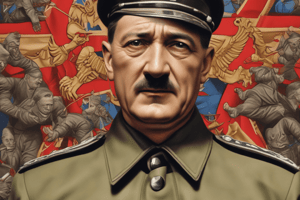Podcast
Questions and Answers
How did the economic hardships in Germany contribute to Hitler's rise to power?
How did the economic hardships in Germany contribute to Hitler's rise to power?
- They diminished Hitler's leadership qualities
- They led to mass unemployment (correct)
- They encouraged peaceful negotiations
- They supported the Treaty of Versailles
What impact did the Treaty of Versailles have on Germany?
What impact did the Treaty of Versailles have on Germany?
- It led to a period of economic prosperity in Germany
- It promoted nationalism and unity in Germany
- It forced Germany to accept responsibility for World War I (correct)
- It facilitated peaceful relations with neighboring countries
What role did Joseph Goebbels play in the Nazis' use of propaganda?
What role did Joseph Goebbels play in the Nazis' use of propaganda?
- He was responsible for ending World War I
- He presented Hitler as a strong and stable leader (correct)
- He enforced the Treaty of Versailles
- He led the economic recovery efforts in Germany
What was the main focus of Goebbels' propaganda campaign?
What was the main focus of Goebbels' propaganda campaign?
How did the Great Depression contribute to Hitler's rise to power?
How did the Great Depression contribute to Hitler's rise to power?
What factor contributed significantly to Adolf Hitler's rise to power?
What factor contributed significantly to Adolf Hitler's rise to power?
How did the Nazi Party aim to gain power?
How did the Nazi Party aim to gain power?
What did the failure of the Munich Putsch in 1923 show Hitler about gaining control of Germany?
What did the failure of the Munich Putsch in 1923 show Hitler about gaining control of Germany?
Which factor played a significant role in Hitler's rise to power alongside his leadership and charisma?
Which factor played a significant role in Hitler's rise to power alongside his leadership and charisma?
What did Adolf Hitler believe about his destiny?
What did Adolf Hitler believe about his destiny?
Flashcards are hidden until you start studying
Study Notes
The Rise of Hitler and the Nazi Party
Adolf Hitler's rise to power can be attributed to a combination of factors, including his leadership and charisma, the role of the Nazi Party, propaganda and mass manipulation, economic hardships in Germany, and the Treaty of Versailles.
Hitler's Leadership and Charisma
Adolf Hitler was an unlikely leader who managed to form a connection with millions of German people, generating a level of charismatic attraction that was almost without parallel. He was driven by a sense of personal destiny and believed he was destined to lead Germany to greatness. Hitler's charisma and the economic situation in Germany played a significant role in his rise to power.
The Role of the Nazi Party
The Nazi Party used various tactics to gain power, including the use of propaganda and mass manipulation. They targeted Jews and Communists as enemies of the German people and used fear to control their opposition. The Nazis also focused on increasing their membership through advertising and propaganda. The failure of the Munich Putsch in 1923 showed Hitler that the Nazis needed to use the rights granted by the Weimar Constitution, such as freedom of the press, the right to assemble, and freedom of speech, to win control of Germany.
Propaganda and Mass Manipulation
Joseph Goebbels, the Reich Minister of Propaganda, played a key role in the Nazis' use of propaganda to build an image of Hitler as a strong, stable leader that Germany needed to become a great power again. Goebbels' propaganda campaign presented Hitler as a new, dynamic, and modern leader for Germany. The Nazis also used propaganda to promote hatred and fear, targeting specific groups and manipulating public opinion.
Economic Hardships in Germany
The economic situation in Germany played a significant role in Hitler's rise to power. The Great Depression of 1929 caused a significant economic downturn in Germany, and the Wall Street Crash led to mass unemployment. In this environment, Hitler's message of nationalism and blame for Germany's struggles resonated with many people. The economic hardships in Germany made the Nazi Party's promises of economic recovery and national greatness more appealing to potential voters.
Treaty of Versailles
The Treaty of Versailles, which ended World War I, also contributed to the rise of Hitler and the Nazi Party. The treaty forced Germany to accept responsibility for the war and imposed harsh economic conditions on the country. These conditions, combined with the economic hardships already present in Germany, created an environment conducive to the rise of the Nazi Party and Adolf Hitler.
In conclusion, the rise of Hitler and the Nazi Party can be attributed to a combination of factors, including Hitler's leadership and charisma, the role of the Nazi Party, propaganda and mass manipulation, economic hardships in Germany, and the Treaty of Versailles. These factors came together to create a dangerous and powerful political force that would have lasting consequences for the world.
Studying That Suits You
Use AI to generate personalized quizzes and flashcards to suit your learning preferences.




